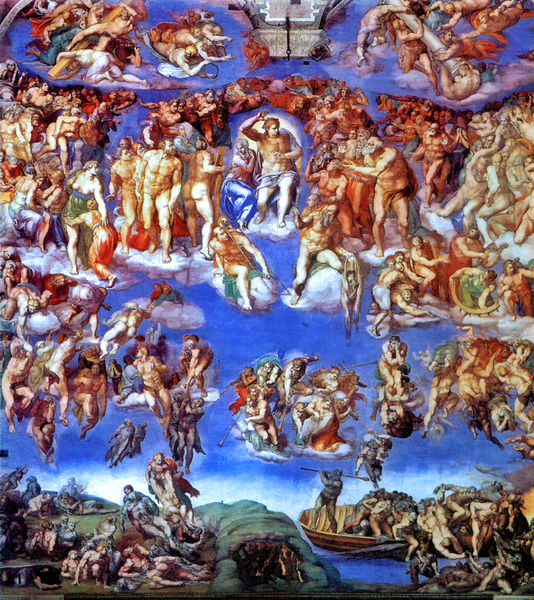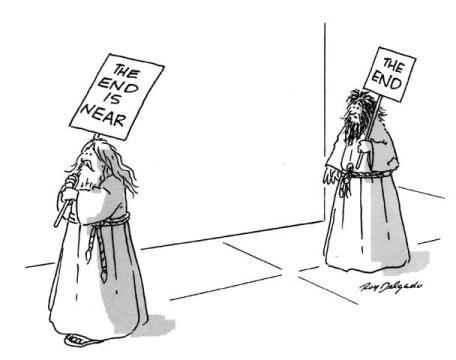 |
Craig White's Literature Courses
Millennialism see also narrative, decline / progress, Future Narratives Compared |
 Michelangelo, The Last Judgment (1536-41) |
Millennialism is the belief that in an end-time or transformation of the world. The most popular forms of millennialism regard the apocalypse as imminent, impending, ready to occur at any moment.
Popular terms for phenomenon: Apocalypse, End-Times, Judgment Day, the Advent, Second Coming (These terms are mostly Christian.)
Academic synonyms or near-synonyms: Apocalypticism, Millennialism, Millenarianism, Eschatology, Messianism, Chiliasm.
The Abrahamic / monotheistic religions—Judaism, Christianity, Islam—are the most apocalyptic, but other world religions like Hinduism or Buddhism also have millennial scenarios or narratives that rise or fall in importance according to historic conditions.
Definition from Oxford English Dictionary. Millenarianism: The doctrine of or belief in the coming of a millennium: (Christian Church) the belief in a future thousand-year age of blessedness, beginning with or culminating in the Second Coming of Christ. In extended use: belief in a future golden age of peace, justice, and prosperity, typically posited on an end to the existing world order.
![]() "beginning with or culminating with" indicates the two primary schools of
millennial thought in Western and American theology:
"beginning with or culminating with" indicates the two primary schools of
millennial thought in Western and American theology:
![]() "pre-millennialism": Christ returns soon, judges the living and
dead, establishes a thousand-year reign of peace and justice followed by a final
battle with Satan's armies. (Pre-millennialism usually associated with
conservative evangelical and fundamentalist Christianity)
"pre-millennialism": Christ returns soon, judges the living and
dead, establishes a thousand-year reign of peace and justice followed by a final
battle with Satan's armies. (Pre-millennialism usually associated with
conservative evangelical and fundamentalist Christianity)
![]() "post-millennialism": Christ returns only after the
church or humanity have established the thousand-year reign of peace and
justice. (Post-millennialism usually associated with liberal or mainline
Christianity)
"post-millennialism": Christ returns only after the
church or humanity have established the thousand-year reign of peace and
justice. (Post-millennialism usually associated with liberal or mainline
Christianity)
Apocalyptic narratives or scenarios are both dreadful and hopeful, beautiful and terrible (in a word, sublime).
The dreadful part is that normal life destabilizes and declines catastrophically: "It's the end of the world as we know it."
Yet billions of people look forward to this end, an attitude that rises partly from millennialists' assurance that they will be saved while others suffer, e.g. "The Rapture."
But the larger hope is that the end of an aging, decadent world delivers the birth of a new, innocent, fresh start, sometimes in the form of a utopia, as with the visions of the New Jerusalem or Heaven at the conclusion of the Bible's book of Revelation.
Revelation, chapter 21
1:
And I saw a new heaven and a new
earth: for the first heaven and the first earth were passed away . . .
2: And I John saw the holy city, new Jerusalem, coming down from God out of
heaven, prepared as a bride adorned for her husband.
. . .
4: And God shall wipe away all tears from their eyes; and there shall be no more
death, neither sorrow, nor crying, neither shall there be any more pain: for the
former things are passed away.
5: And he that sat upon the throne said,
Behold, I make all things new.
![]()
Secular apocalyptic stories; e. g., alien invasion stories, disaster movies
|
Independence Day (1996) The War of the Worlds (1897, + later broadcasts and movies) 28 Days Later (2002; zombie post-apocalypse); World War Z The Day the Earth Stood Still (1951, 2008) Knowing (2009) |
environmental apocalypse Parable of the Sower (1993) The Day After Tomorrow (2004) 2012 (2009)
|
shape of story: linear, with beginning and end
"Apocalyptic Narrative" |
 End-Times (B) requires point A of Creation ("In the beginning . . . ") Judeo-Christian world-narrative: (A) Creation / Genesis > (Human History) > (B) Apocalypse / Revelation As narrative, model conforms to Aristotle (Poetics VII) that a plot or narrative must have "a beginning, a middle, and an end." (The "middle" here would be human or national history, bookended by eternity.) |
Judeo-Christian contribution to Western (> world) history: most other civilizations have conceived time in cyclical terms, like nature or evolution.
But Genesis marks beginning of time, Revelation end of time
Conforms with familiar modern linear ideas of time like "time is a river" or "the arrow of time"
In literature, the most compelling stories at least on a popular level tend to be simple stories with clear progressions and delineations of good and evil.
Evolution is much more complicated. The many different directions evolution takes all at once can make it hard to tell a simple, direct story about a single individual or organism, since all natural phenomena co-evolve more or less in relation to each other.
The apocalyptic or millennial narrative influences many theories of history, most notably Marxism. Marx was descended from a family of rabbis, and saw the struggle of history resulting in a grand finale of shared property, wealth, and well-being, somewhat like heaven in earthly terms.
![]()
Sources or motivations of millennial / apocalyptic future narrative
sources: scripture, revelation, tradition
motivation: "Declinist" thinking . . .
"Things are really getting bad out there.". . . "Things aren't like they used to be."
"The system can't take much more until everything falls apart."
"You can't go anywhere, trust anybody, any more."
Such perspectives may show a selective, idealized memory of the past that discounts many signs of progress such as lower infant mortality, normative justice, longer lifespans, less physical suffering,
![]()
Detractions of millennial / apocalyptic future narrative
Historical failure: Off and on through Western history the Second Coming is proclaimed but doesn't happen. Nationwide In the USA, every few years "millennial fever" grabs the attention of large numbers of Americans, who never seem to remember—or learn from—the fact that the same phenomenon of anxiety and false-alarm happened only a few years earlier.
The "Little Apocalypse": Matthew 24
34 Verily I say unto you, This generation shall not pass, till all these things be fulfilled.
35 Heaven and earth shall pass away, but my words shall not pass away.
36 But of that day and hour knoweth no man, no, not the angels of heaven, but my Father only.
Effect on attitudes towards life on earth?
Not worth saving? No need for progress or reform? All human endeavor doomed?
> focus on individual salvation instead of collective improvement (compatible with capitalistic competition)
![]()
Attractions, appeals, or reasons for popularity of millennial / apocalyptic narrative
Spiritual or non-empirical reasons:
![]() It may be true!
Unlike the empirical facts and theories of science, belief can't be
proven or disproven like a scientific experiment.
Skeptics abound, but belief is trans-cultural. A historian can prove that it hasn't happened,
but not that it won't happen. Therefore the Revelation
narrative in some sense exists outside history? Always in the future?
It may be true!
Unlike the empirical facts and theories of science, belief can't be
proven or disproven like a scientific experiment.
Skeptics abound, but belief is trans-cultural. A historian can prove that it hasn't happened,
but not that it won't happen. Therefore the Revelation
narrative in some sense exists outside history? Always in the future?
![]() But also the spiritual power of literature can't be denied—see
aesthetic reasons below.
But also the spiritual power of literature can't be denied—see
aesthetic reasons below.
Secular or empirical reasons:
![]() For two
thousand years Christian evangelists have been repeating and reinforcing the
story, but they wouldn't be doing so if audience wasn't receptive--so why do
people like this story?
For two
thousand years Christian evangelists have been repeating and reinforcing the
story, but they wouldn't be doing so if audience wasn't receptive--so why do
people like this story?
![]() Human mind not designed to think very far into past or future: next meal > children's
generation (Most people's sense of the past is only about a century deep at
most.)
Human mind not designed to think very far into past or future: next meal > children's
generation (Most people's sense of the past is only about a century deep at
most.)
![]() Scale of time in creation /
apocalypse: 6000-10,000 years?
That's a long time in human terms, but far more manageable than "evolutionary
time," which is often expressed in millions or billions of years.
Scale of time in creation /
apocalypse: 6000-10,000 years?
That's a long time in human terms, but far more manageable than "evolutionary
time," which is often expressed in millions or billions of years.
![]() People who like apocalyptic narratives trust they will not
themselves suffer the fate of the damned or doomed. (Put another way, it's hard
to imagine a reader looking forward to the apocalypse without having
faith in being saved.)
People who like apocalyptic narratives trust they will not
themselves suffer the fate of the damned or doomed. (Put another way, it's hard
to imagine a reader looking forward to the apocalypse without having
faith in being saved.)
![]() The
apocalyptic narrative can be redeployed and rescripted to historic subjects like war, climate
change, nuclear weapons, overpopulation, Islamic terrorism.
The
apocalyptic narrative can be redeployed and rescripted to historic subjects like war, climate
change, nuclear weapons, overpopulation, Islamic terrorism.
Aesthetic reasons—i.e., why the essential qualities of the story appeal to human readers.
![]() Story is dramatic, immediate, simple.
Revelation 1.1 things which must shortly come to pass
Story is dramatic, immediate, simple.
Revelation 1.1 things which must shortly come to pass
![]() Vivid
imagery and symbols with
sublime effects
(beautiful but frightening)
Vivid
imagery and symbols with
sublime effects
(beautiful but frightening)
![]() sublime:
audience receives vicarious excitement of being exposed to danger and
destruction followed by release or relief or rescue; cf. roller-coaster,
thrill-rides, video combat, hero movies.
sublime:
audience receives vicarious excitement of being exposed to danger and
destruction followed by release or relief or rescue; cf. roller-coaster,
thrill-rides, video combat, hero movies.
![]() Resemblance to "romance"
narrative: trials > transcendence; sharp separation of characters b/w innocent
and guilty. (Scroll to bottom of romance page)
Resemblance to "romance"
narrative: trials > transcendence; sharp separation of characters b/w innocent
and guilty. (Scroll to bottom of romance page)
![]() Idea of a messiah or savior who saves or
changes everything for the better. (Again compare romance
narrative of rescue.)
Idea of a messiah or savior who saves or
changes everything for the better. (Again compare romance
narrative of rescue.)
![]() End of old world
> beginning of new
world—"New Heavens and New Earth" (Rev. 21.1)
End of old world
> beginning of new
world—"New Heavens and New Earth" (Rev. 21.1)
![]()
cultural appeal
![]() Apocalyptic thinking rises during
periods of rapid, disorienting change (which is nearly always in America, "the
hypermodern nation").
Apocalyptic thinking rises during
periods of rapid, disorienting change (which is nearly always in America, "the
hypermodern nation").
![]() Every generation has far more people than
previous generation, stimulating economic activity, stress, mobility, relocation, growth, change.
Every generation has far more people than
previous generation, stimulating economic activity, stress, mobility, relocation, growth, change.
![]() Scientific, technological, and social change
are self-accelerating, so that each level of change feeds faster change.
Scientific, technological, and social change
are self-accelerating, so that each level of change feeds faster change.
![]() Examples: Computer generations: if you own it, it's
obsolescent
Examples: Computer generations: if you own it, it's
obsolescent
![]() Americans have conflicted attitudes toward
change, progress, etc.
Americans have conflicted attitudes toward
change, progress, etc.
In sum, apocalyptic thinking may be a natural mental-emotional reaction to change occurring more rapidly than ever.
In fact, the world is always ending and starting over?
Rip Van Winkle syndrome: Every American grows up into a different world than he or she was born in. . . . > inevitable sense of loss and decay.
American history and apocalyptic thinking
It's always end-times in America. With some variations in intensity, Evangelical Protestants of every generation think of themselves as "the last generation."
Shakers, Latter-Day Saints, Jehovah's Witnesses, Seventh-Day Adventists, and other historical denominations of Protestant Evangelicals and / or cults including, in some aspects, the Puritans.
(Jehovah's Witnesses, Seventh-Day Adventists, and Branch Davidians all descended from the first mass evangelical apocalyptic movement, "the Millerites" of 1840s, near the end of the Second Great Awakening.)
The fact that every generation so far has been wrong does nothing to dampen excitement for end-times or fresh welcome to "the news" that Jesus will return soon.
e. g., "Rapture Enthusiasm" built up toward 2000. Given the significance of the number 2000, one might assume that, following yet another failed prophecy, apocalyptic thinking would cool off, but 9/11, Iraq War, and other Holy Land conflicts inflamed apocalyptic thinking again—not to mention increasing political and media power of Protestant Evangelicals and increasing rejection of secular progress as contrary to divine will.
Utopian alternatives as possible outcomes of apocalyptic thinking
No extreme revisions of human society without extreme threats
(cf. Social Security)
Timing of end-times
apocalyptic prophets and preachers always say the world will end "soon" or "in our generation" but tend not to specify exactly when the world will end
Why not?
If you specify a time and date, people may simply stop working and wait for end, which disables economic support for apocalypticism.
Any attempts to set dates have so far ended in embarrassment. Outside world mocks, further disabling economic support. Some members leave apocalyptic groups following disappointments . . . .
But the surprising finding is that many followers of apocalyptic groups increase their commitment after disappointments. Jehovah's Witnesses as most striking example.
Anyway, most apocalyptic prophets and preachers work in a mid-zone of saying it's soon without saying exactly when. That way they maintain tension and excitement without the downsides of disappointment, ridicule, distancing from outside world.
Examples of millennialism in Colonial-Postcolonial Literature
2012
Aztecs & Cortez, 1521 Quetzalcoatl

Eschatology (Oxford English Dictionary) a. The department of theological science concerned with ‘the four last things: death, judgement, heaven, and hell.'
b. In recent theological writing, esp. as ‘realized eschatology’ (see quot. 1957), the sense of this word has been modified to connote the present ‘realization’ and significance of the ‘last things’ in the Christian life.